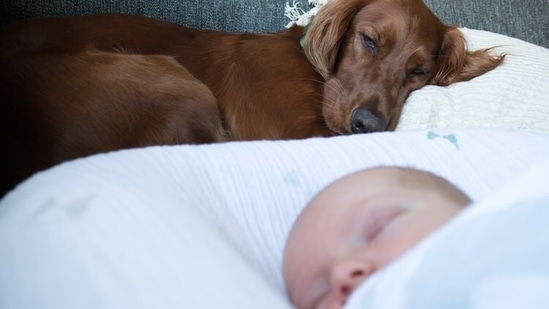Here's why children who sleep with their pets still get a good night's rest
Aside from taking up space, noisy scratching, or triggering allergies, the most common assertion averred that your four-legged friend would disrupt your sleep. However, a new study tells a different story.
There is a long-held belief that having your pet sleep on the bed is a bad idea. Aside from taking up space, noisy scratching, or triggering allergies, the most common assertion averred that your four-legged friend would disrupt your sleep. However, a new study tells a different story.

Researchers at Concordia's Pediatric Public Health Psychology Lab (PPHP) found that the sleep quality of the surprisingly high number of children who share a bed with their pets is indistinguishable from those who sleep alone.
The findings of the study were published in the journal 'Sleep'.
"Sleeping with your pet does not appear to be disruptive," said the paper's lead author, PhD student Hillary Rowe.
Rowe added, "In fact, children who frequently slept with their pet endorsed having higher sleep quality."
Rowe co-wrote the paper with fellow PPHP researchers Denise Jarrin, Neressa Noel, Joanne Ramil and Jennifer McGrath, professor of psychology and the laboratory's director.
Serendipitous findings
The data the researchers used was found amid the findings of the larger Healthy Heart Project, a longitudinal study funded by the Canadian Institutes of Health Research, which explores the links between childhood stress, sleep and circadian timing.
Children and parents answered questionnaires about bedtime routines and sleep hygiene: keeping a consistent bedtime, having a relaxing pre-sleep routine and sleeping in a quiet comfortable space. For two weeks, children wore wearables (wrist actigraphy) and filled out daily logs to track their sleep.
Children were also fitted with a specialized home polysomnography device for one night to allow the researchers to record their brain waves (EEG signals) while they were sleeping.
"One of the sleep hygiene questions asked if they shared their bed with a pet," McGrath said. "We were startled to find that one in three children answered yes!"
Following this discovery, they looked to see what the existing literature said about the subject of bed-sharing with animals. They found a few studies with adults, but almost nothing with youth.
"Co-sleeping with a pet is something many children are doing, and we don't know how it influences their sleep," Rowe added. "So, from a sleep science perspective, we felt this was something important we should look into."
Shining a better light on sleep measurement
The researchers categorized the children into one of three groups based on how often they sleep with their pet: never, sometimes or frequent. They then compared the three groups across a diverse range of sleep variables to see if there were any significant differences between them.
"Given the larger goals of the Healthy Heart Project, we were able to not only look at bedtimes and amount of time sleeping (duration), but also how long it took to fall asleep (latency), nighttime awakenings (disruptions) and sleep quality," McGrath said.
They found that the three groups were generally similar across all sleep dimensions.
"The findings suggest that the presence of a pet had no negative impact on sleep," Rowe noted. "Indeed, we found that children who slept with their pets most often reported higher perceived sleep quality, especially among adolescents."
She hypothesizes that the children are more likely to consider pets as their friends and derive comfort from sleeping with them.
"These findings also sharpen our thinking about how to improve technology to measure sleep," McGrath added.
"Many wearables like Apple Watch and Fitbit or even smartphones themselves have accelerometers that detect movement to decode one's sleep. Given the number of people who share their bed with their partner, or their pet, it may be sensible to develop a setting for co-sleeping to tweak the algorithm used to define sleep intrusions or awakenings, which would make for a much more accurate sleep assessment," McGrath concluded.
Catch your daily dose of Fashion, Health, Festivals, Travel, Relationship, Recipe and all the other Latest Lifestyle News on Hindustan Times Website and APPs.



